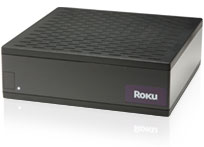Linux STBs star on Amazon HD service
Apr 22, 2009 — by Eric Brown — from the LinuxDevices Archive — 2 views Amazon announced that it has upgraded its Video on Demand service to HD (high definition) video. The service supports a number of Linux-based IP STBs (set-top boxes), including various TiVo HD DVRs, Sony's Bravia Internet Video Link, and Roku Netflix Player (pictured), according to eWEEK.
Amazon announced that it has upgraded its Video on Demand service to HD (high definition) video. The service supports a number of Linux-based IP STBs (set-top boxes), including various TiVo HD DVRs, Sony's Bravia Internet Video Link, and Roku Netflix Player (pictured), according to eWEEK.
The Amazon Video On Demand HD service offers customers the option to rent more than 500 HDTV shows and movies, writes Nathan Eddy in our sister publication eWEEK. Customers streaming the videos for playback via the above supported STBs, as well as directly onto Panasonic's Viera Cast-enabled HDTV televisions, can rent HD movies a la carte for $4 to $5 apiece. There is also said to be an option to view the movies on Windows and Mac PCs for $3 a shot.
 Sony Bravia Internet Video Link (Click for details) |
The TiVo DVR devices have long been known to run Linux, although they have not always followed the dictates of the GPL to the satisfaction of open-source watchdogs such as the Free Software Foundation (FSF). Supported TiVo boxes are said to include the TiVo Series3, HD, and HD XL DVRs.
 Roku Netflix Player (Click for details) |
Sony, meanwhile, introduced its Bravia Internet Video Link IP-STB (pictured above) only last September. The Linux-based box is designed to receive Internet video and content via an Ethernet link and broadband connection, and then stream content to a Sony Bravia HDTV.
The Roku Netflix Player (pictured at left and at the top of our story) can now download Amazon HD flicks along with its current support for the Netflix subscription video service. The $100 Linux-based Player offers a remote control, Ethernet, WiFi, and a full lineup of A/V connections, including HDMI.
Though Amazon touts its video on demand service as offering HD, we have not seen any claims as to actual resolution, though the Roku Netflix Player, for example, is said to offer 720p as its best video output — hardly comparable to Blu-Ray. When we attempted to test the Amazon service via a Roku device, using a 802.11b/g wireless networking and a 2Mbps DSL connection, we were informed that there was insufficient bandwidth to display HD content. This could be a problem for many users, since with the Roku device, movies are streamed, not downloaded.
Other IP STB hardware and software
Blockbuster introduced a competitor to Roku's Netflix Player with its Linux-based MediaPoint IP-STB developed by 2Wire. The MediaPoint is targeted at Blockbuster's own movie rental service and, like the Roku device, does not let users store movies.
Meanwhile, DRM-free (digital right management free) IP STB alternatives that run Linux include Myka's TorrentTV, which offloads BitTorrent peer-to-peer duties from a PC platform, and the Neuros LINK box, which works with its own free Neuros.TV service.
Software-only IP-STB solutions compatible with Linux include the cross-platform, open-source “social” media center distribution Boxee. The distribution offers a unified gateway to a variety of social- and media-networking services, and also supports Netflix video downloads. Boxee recently unveiled the first formal release of its Boxee API as an open source offering.
Boxee suffered a setback in recent months when Hulu forced Boxee to remove support for its media download service from the Boxee distribution. However, according to DeviceGuru, this state of affairs has been partially overcome with a Hulu hack that involves cutting and pasting video feed URLs from Hulu's RSS feed page to the Boxee RSS feed page.
Availability
The Amazon Video On Demand HD service is available now at a price of $4 to $5 per downloaded movie, says the company. The eWEEK story by Nathan Eddy, “Amazon Offers Video on Demand Content in HD,” should be here.
This article was originally published on LinuxDevices.com and has been donated to the open source community by QuinStreet Inc. Please visit LinuxToday.com for up-to-date news and articles about Linux and open source.